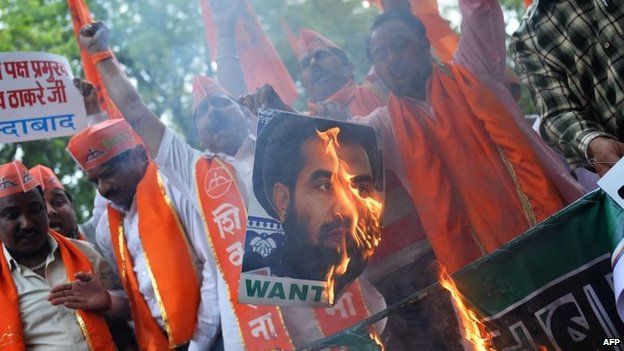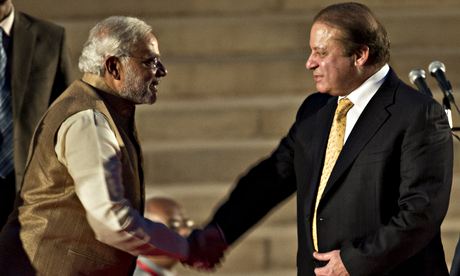The operational leader and co-founder of LeT, Zaki-ur-Rehman Lakhvi, was arrested in 2008 in connection with the attack. He has been incarcerated for the past 7 years. Back in December 2014, a court ordered Lakhvi released on bail. The Pakistani government opposed the decision and kept him incarcerated, but this past Thursday the Pakistani supreme court ordered that Lakhvi be released immediately.
 |
| Protests in India followed the court ruling ordering Lakhvi released (Source: BBC) |
This will likely have negative effects on India-Pakistan relations, which have somewhat thawed following the election of India's Prime Minister Modi and a positive exchange of letters amongst the countries' leaders.
What is especially troubling is how little is known about Lakhvi's trial, which has been ongoing since 2009 and is not open to the public:
The commander, Zaki-ur-Rehman Lakhvi, and six other members of the Lashkar-e-Taiba militant group have been on trial since 2009 at a high-security jail in Rawalpindi, just south of Islamabad, on charges of participating in the Mumbai operation.
But the trial has been conducted largely in secrecy, and its halting pace has given rise to speculation that its progress is being influenced by the vagaries of wider tensions between Pakistan and India.
While this doesn't mean the case is dismissed, only time will tell whether Lakhvi appears for the remainder of the trial. While locked up, he wasn't exactly treated like a commander of a terrorist organization:
While Pakistan's government claimed that it was cracking down on terrorists, Zakiur-Rehman Lakhvi and six of his comrades in Rawalpindi's sprawling Adyala Jail had several rooms next to the jailer's office at their disposal.
And with the jailer's permission, they had a television, mobile phones and access to the internet, as well as dozens of visitors a day.
"He [Lakhvi] can receive any number of guests, any time of day or night, seven days a week," said one jail official while the terror suspect was under lock and key.
No special permission was required for visitors, who were not even asked to identify themselves to jail authorities.
That access allowed Lakhvi to retain his position as a high-ranking LeT commander even while he was incarcerated. This is not simply a question of prison conditions. LeT has been declared a terrorist organization by the United States and the UN Security Council and banned in Pakistan since 2002.
Letting one of their commanders continue to run the organization from prison is an insult to the memories of those who have died at the hands of LeT terror. While arresting him and bringing him to trial in Pakistan were steps in the right direction for a government that has often been seen as having sympathies toward LeT, the recent supreme court ruling that released him is a step in the wrong direction. While the Pakistani government publicly opposed that decision, it has been treating him in a manner for the past 5+ years that suggests it is not as eager to take on LeT as it claims. Reaction in India to the decision has, unsurprisingly, been quite negative. If Lakhvi and other LeT officials are ultimately acquitted, that negativity will likely manifest itself in worsening relations between two countries that seemed on track to gradually improve their historically volatile relationship.
